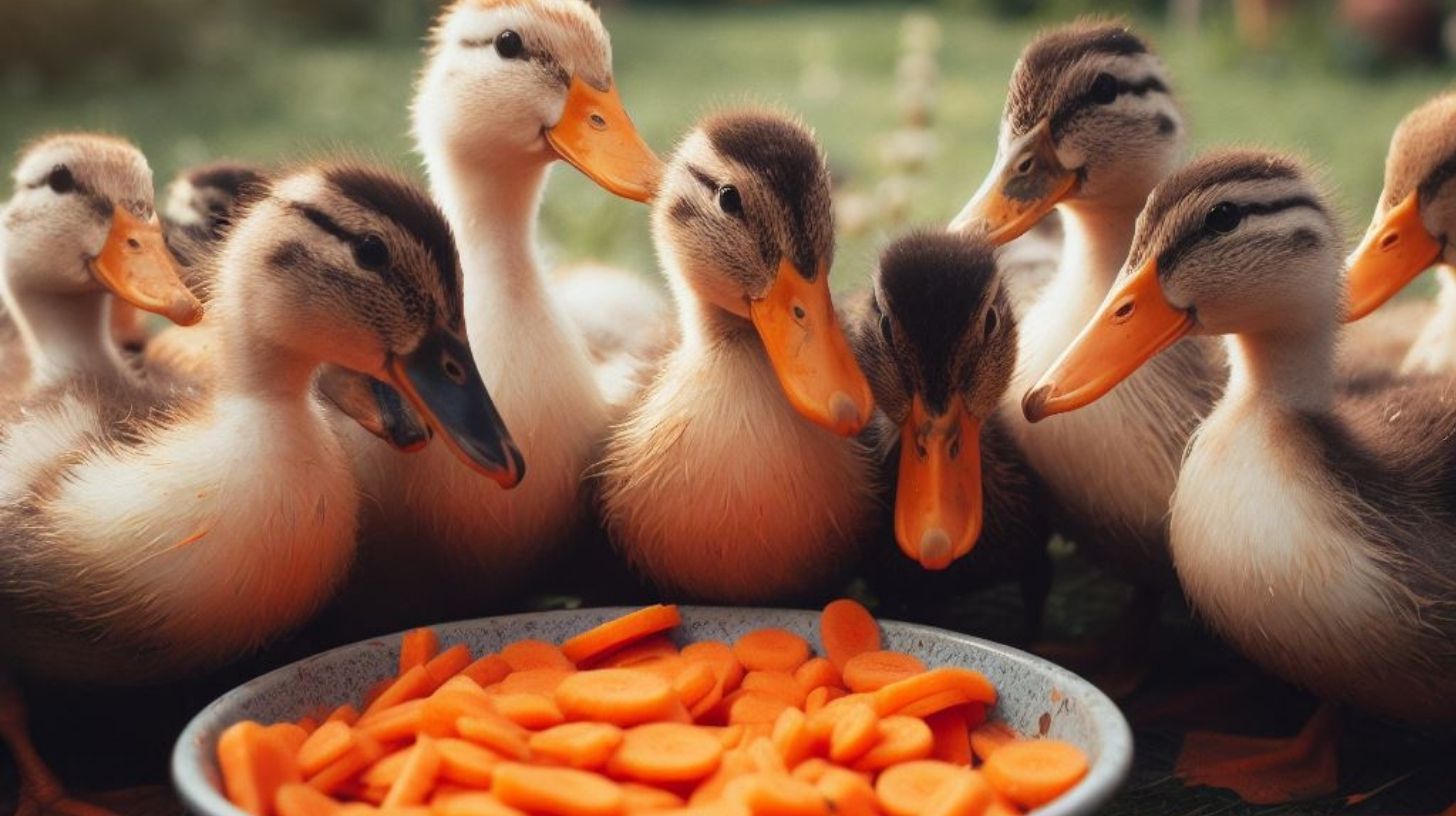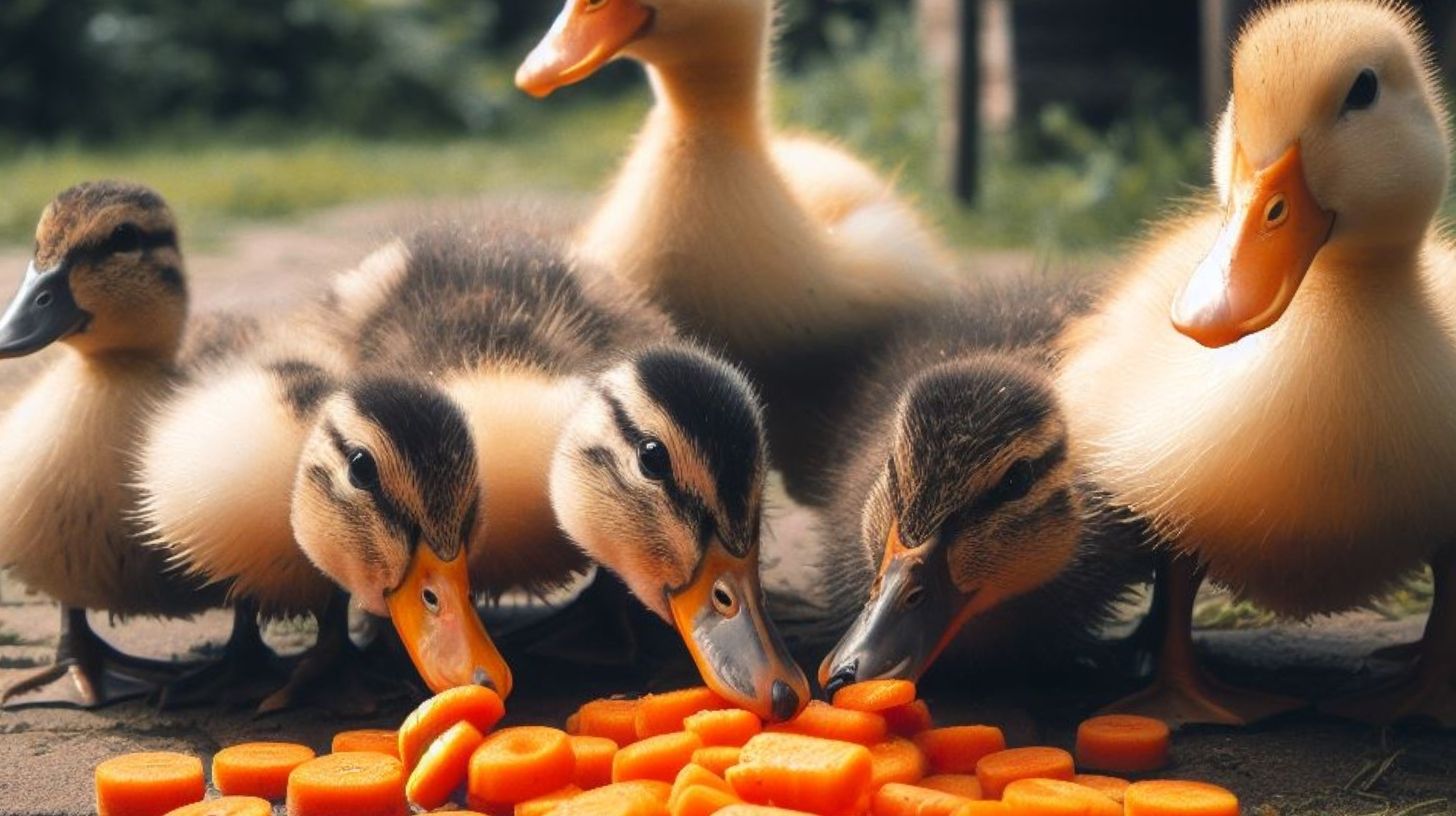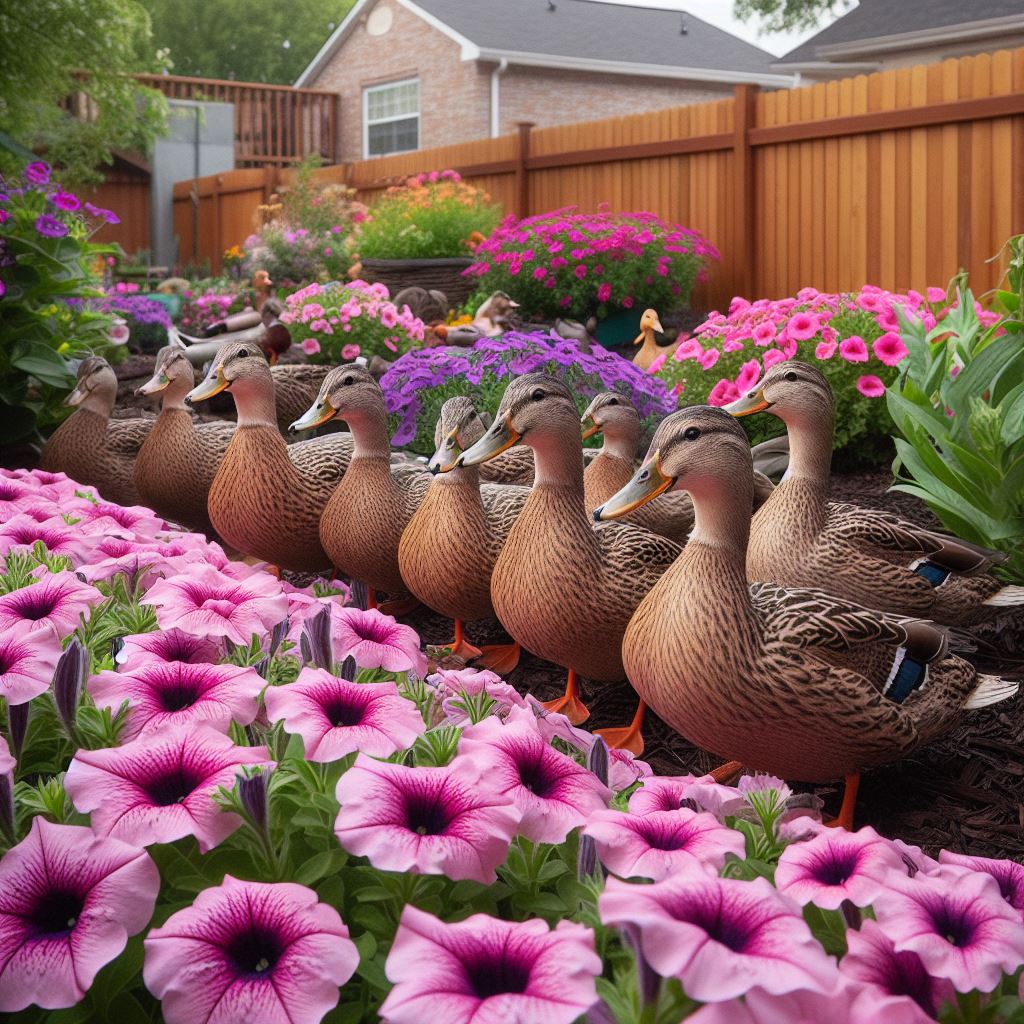Can Ducks Eat Carrots? Benefits, Risks and Feeding Tips

Table of content:
Carrots make a crunchy, sweet treat for humans and rabbits alike. But what about our feathered friends? Can ducks eat carrots?
The short answer is yes. Ducks are omnivores meaning they eat both plant and animal matter. Carrots, being a vegetable, fall into the plant category making them a viable food option.
Key Takeaways:
- Ducks are omnivores and can eat a variety of foods including carrots. Wild ducks eat insects, plants, and seeds while domestic ducks can eat poultry feed.
- Carrots can be fed to ducks in moderation as treats. They provide vitamins, minerals, and fiber.
- Feed ducks chopped, cooked carrots to prevent choking. Avoid too many starchy vegetables.
- Ducks need a balanced diet with protein. Bread has low nutritional value. Offer chopped greens, oats, corn, seeds, peas, and crumbled eggs.
- Only feed domestic ducks. Do not feed wild ducks human food as it can disrupt their natural foraging habits.
While wild ducks have a different natural diet, domesticated pet ducks and ducks on small backyard farms can enjoy carrots in moderation. Read on to learn more about feeding carrots and other produce to ducks.
What Do Wild Ducks Eat?
Ducks in the wild have a diverse diet thanks to their omnivorous nature. Their nutritional needs fluctuate depending on the season and habitat.
Wild ducks eat a combination of plants, seeds, nuts, fruits, insects, worms, fish, amphibians and other small aquatic animals. The availability of food sources depends on whether ducks are migrating, nesting, molting or residing in their natural environment.
Here is an overview of what wild ducks eat:
- Seeds & Grain – Wild ducks eat grains and seeds from plants that grow near the water. This includes grasses, aquatic plants, shrubs, trees, and farming crops.
- Insects – Aquatic insects like mosquito larvae, tadpoles, snails and shrimp are protein sources. Some ducks also eat flying insects like moths, beetles, and flies.
- Plants – Ducks consume parts of aquatic plants, especially roots, stems, leaves and seeds that grow in wetlands.
- Small Fish – Fish eggs and small fish are part of a duck’s carnivorous diet. They find these in shallow waters.
- Amphibians – Frogs, salamanders and other small wetland animals provide essential protein.
Since wild ducks get a balanced diet from their environment, they do not need supplemental feeding from humans. In fact, human food can disrupt their natural foraging behaviors and nutrition. It’s best not to feed wild ducks human foods like bread, corn or carrots.
 What Do Domestic Ducks Eat?
What Do Domestic Ducks Eat?
Domestic ducks that live on farms or in backyards don’t have the same access to diverse, natural food sources. Their diet consists primarily of commercial duck feed.
Duck feed is a commercially formulated pellet that contains a balanced mix of grains, seeds, vitamins and minerals. This approximates the nutritional variety wild ducks receive in nature.
Some key ingredients in duck feed include:
- Protein – Soybean meal, fish meal and amino acids for growth.
- Carbohydrates – Grains like wheat, barley and oats for energy.
- Fiber – Alfalfa, beet pulp and grains for digestion.
- Fats – Vegetable oil, fish oil and flax for skin and feathers.
- Minerals & Vitamins – Calcium, phosphorus, salt and vitamin supplements.
In addition to a quality duck feed, domestic ducks enjoy supplements like:
- Leafy Greens – Kale, lettuce, spinach provide nutrients.
- Vegetables – Peas, squash, zucchini, sweet potatoes offer variety.
- Fruits – Chopped melons, berries, apples in moderation.
- Protein – Mealworms, crickets, chopped hard boiled eggs.
- Grit – Gravel to aid digestion.
Can carrots be part of a domestic duck’s diet? Let’s take a look at the benefits and risks.
Can Ducks Eat Carrots?
Yes, domestic ducks can eat carrots. Both raw and cooked carrots can be fed to ducks in small quantities as a supplemental treat.
Carrots offer the following nutritional benefits:
- Vitamin A – For immune system health, eyesight and growth.
- Vitamin K – For blood clotting and bone development.
- Potassium – For fluid balance and muscle contractions.
- Fiber – For healthy digestion and nutrient absorption.
However, too many carrots and starchy vegetables can lead to health issues in ducks:
- Weight gain – Overfeeding treats adds unnecessary calories.
- Nutrient imbalance – Too many vegetables and fruits dilutes balanced nutrition.
- Digestive problems – Excess starch and sugar ferment in the gut.
For optimal nutrition, carrots should be fed in moderation along with commercial duck feed and leafy greens.
When feeding carrots to ducks, keep the following tips in mind:
- Chop carrots into small pieces to prevent choking.
- Cook carrots to soften for easier eating and digestibility.
- Limit portion to 1-2 small baby carrots or carrot sticks per duck per day.
- Skip a day between carrot treats to avoid overfeeding.
- Remove uneaten portions within 20 minutes.
What Vegetables Can Ducks Eat?
Ducks can eat a variety of vegetables in addition to carrots. Focus on offering dark, leafy greens and limit high-sugar produce.
Good Vegetables for Ducks
- Kale
- Spinach
- Lettuce – romaine, green leaf
- Swiss chard
- Collard greens
- Turnip greens
- Beet greens
- Broccoli
- Squash
- Peas
- Corn
Vegetables to Avoid or Limit for Ducks
- Potatoes
- Sweet potatoes
- Yams
- Beets
- Carrots
- Tomatoes
- Peppers
When introducing new vegetables, start with small amounts and watch for any diarrhea or changes in appetite which may indicate digestive upset.
It’s healthiest for ducks when vegetables complement a quality feed without exceeding 10% of total food intake.
What Fruits Can Ducks Eat?
Ducks can eat small portions of certain fruits as an occasional treat. Since many fruits have high sugar content, they should be limited to prevent obesity and other health issues.
Some fruits ducks can eat include:
- Grapes – halved to prevent choking
- Melons – watermelon, cantaloupe, honeydew
- Berries – strawberries, blueberries, raspberries
- Apples – chopped or shredded
- Bananas – small pieces
Avoid citrus fruits, avocados, fruit pits and seeds which can cause chocking or toxicity.
As with vegetables, fruits should not make up more than 10% of a duck’s diet. Stick to a few times a week as a supplement to nutritionally complete feed.
What Proteins Can Ducks Eat?
Protein is essential for duck growth and development. While commercial feeds are formulated with soybean meal, amino acids and other proteins, additional options include:
Mealworms and Crickets – Excellent source of protein and enjoyed by ducks as a treat. Prioritize over fruits and veggies.
Chopped Hard Boiled Egg – Remove shell before feeding small pieces. A great protein boost a few times a week.
Chicken Layer Pellets – Some duck owners offer a handful of chicken feed to balance commercial duck rations.
Leftover Poultry Meat – Shredded chicken or turkey can be added to feed. Avoid seasoned meats.
Insects and Grubs – Ducks will forage for naturally occurring insects in the garden. Just beware of pesticides.
Protein should make up 16-24% of a duck’s diet depending on age according to Purdue University. Consult your veterinarian for customized recommendations.
Should You Feed Ducks Bread?
Bread is a notorious duck food thanks to cartoons and movies showing ducks eating slices of white bread. But just because they will eat it, bread provides little nutritional value.
Ducks lack the enzyme amylase needed to properly digest the simple carbohydrates in bread. Undigested bread can ferment in the digestive tract leading to:
- Malnutrition
- Angel wing deformity
- Metabolic disorders
- Obesity
- Poor feather condition
The high salt content found in most bread can also lead to excessive thirst and water retention. Ducks naturally get carbohydrates from the grains present in their balanced feed.
For the health of ducks, it’s best to avoid offering bread, crackers or similar human foods low in overall nutrition. Focus their diet on commercial feed, leafy greens, some vegetables and occasional protein supplements.
Can You Feed Wild Ducks?
As mentioned earlier, wild ducks are adapted at foraging a complete and balanced diet from their natural environment. They do not require supplemental feeding from humans.
In fact, feeding wild ducks human scraps can be detrimental:
- It leads ducks to become too reliant on easily accessed human food rather than naturally forage.
- Ducks may fight aggressively over hand-fed food.
- Poor nutritional balance can cause diseases like angel wing.
- Poor sanitation increases the risk of sickness when ducks congregate.
- Well-meaning feeding encourages overpopulation when ducks reproduce to take advantage of easy food sources.
- Bread and similar items offer little real nutritional value.
For their health and safety, avoid feeding wild ducks human foods. Only offer commercial duck or waterfowl feed in extreme winter emergencies when natural food is scarce.
Admire wild ducks from a distance as beautiful wildlife. Refrain from altering their natural behaviors through supplemental feeding.
Frequently Asked Questions
How often should you feed ducks?
Ducks thrive on a consistent daily feeding schedule. Feed commercial duck feed ad libitum so it is always available. Offer portioned fruits, vegetables and treats 1-2 times per day.
What’s the best food for baby ducks?
Baby ducks under 6 weeks need a starter crumble feed with at least 20% protein. Avoid treats but provide fresh water and chick grit.
Do ducks need grit?
Yes, grit helps ducks grind and digest fibrous foods. Offer insoluble granite grit rather than sand-based grit.
Can too many carrots kill a duck?
Too many carrots can lead to health issues but are unlikely to directly cause death. Issues seen include choking, obesity, angel wing and nutrition imbalances.
What household foods can ducks eat?
Ducks can eat raw oats, chopped greens, corn, peas, bird seed, mealworms. Avoid salty, sugary and processed human foods.
Conclusion
Ducks are unique in the bird world because their diverse palate allows them to eat a combination of plants and animals. Both wild and domestic ducks thrive when their nutritional needs are met through species-appropriate diets.
For wild ducks, we can support their natural foraging behaviors by simply observing them without interference. Meanwhile, domestic ducks benefit from measured amounts of produce like carrots as supplemental treats to a complete feed. By understanding what ducks eat in the wild and what they need in captivity, we can best support their health and happiness while enjoying their beauty.
Welcome. I’m Adreena Shanum, the proud owner of this website, and I am incredibly passionate about animals, especially poultry. I founded adreenapets.com as a labor of love, stemming from my desire to share my knowledge and experiences with poultry enthusiasts worldwide.



